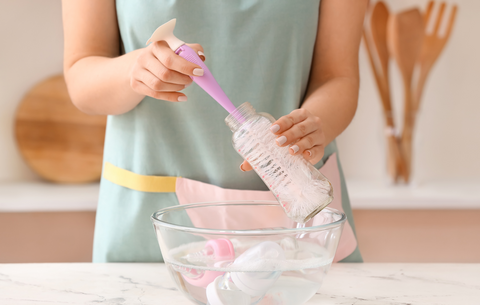
Pros and cons of bottle feeding your baby
Share
For many new mothers the choice to breastfeed or bottle feed their baby can feel overwhelming, with lots of information and guidance celebrating the benefits of breastfeeding only.
While breastfeeding is a natural option and recommended by healthcare providers many mothers choose to bottle feed for a variety of reasons. Every mother has the right to decide how to feed their baby and bottle feeding is a valid and preferable option for many new mums.

In this article, we will discuss the pros and cons of bottle feeding, from the best bottles you can use to whether bottle feeding can be affordable. As you approach the birth of your baby it is useful to consider all your options and make an informed decision that is best for you and your baby.
Pros of bottle feeding
Sharing feeding duties
Bottle feeding allows for more flexibility in scheduling feeds, as you can divide the responsibility between yourself and your partner. Bottle feeding can allow a new mother to rest more following the birth and recover fully while their partner shares feeding duties.
When my daughter was born she was uninterested in breastfeeding and we bottle-fed her pumped breastmilk. This was very helpful in allowing me to recover from my c-section delivery and meant that my husband felt included in the feeding duties.

Returning to work
Bottle feeding your baby can be very helpful when it comes to mothers returning to work. A bottle-fed baby will be able to go to a nursery or be left with a trusted caregiver in the knowledge that they will be fed without difficulty.
Bonding
Often breastfeeding means one partner misses out on special bonding time with the baby as they become dependent on the breastfeeding parent. Bottle feeding allows both parents to share the feeding duties and therefore create secure bonds with their baby as they hold them close to feed them.
Cons of bottle feeding
Cost
Bottle feeding incurs several more costs than breastfeeding. You need to buy multiple bottles, teats, bottle warmers, steriliser equipment, and special cleaning tools to ensure that bottles are fully cleaned. If you are formula feeding you also need to regularly buy formula for your baby.
Time
It takes time to make a bottle of formula or warm up breast milk, which is not ideal when you have a hungry baby crying to be fed. You will also find yourself spending a lot of time cleaning and sterilising bottles, although there are machines to make this process easier.

Potential health risks
If you choose to formula feed, your baby will of course receive enough nutrition to keep them healthy, however, they will miss out on the immune-boosting properties that breast milk offers.
Conclusion
As you approach your due date month, it's important to consider all of your options when it comes to feeding your baby. While breastfeeding is often the recommended option, there are pros and cons to both breastfeeding and bottle feeding.
Bottle feeding is often the only option if you are unable to breastfeed due to health concerns, medication, or inability to produce milk. In some cases babies can also refuse to breastfeed, as was the case with my daughter, making bottle feeding the only option to keep your baby fed and healthy.
Ultimately the decision to bottle feed or breastfeed your baby is a personal choice that should be made based on your preferences and circumstances.
If you are still unsure about the best way to feed your baby and are worried you should speak to your healthcare provider to help you make an informed decision that is best for you and your baby.

